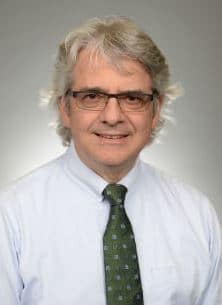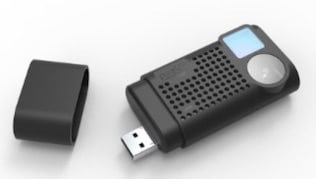By Rainer Hüls, Audio Infos Germany
The 62nd EUHA congress will start this Wednesday, October 18th, in Nuremberg. According to EUHA president Martin Blecker the main issues of this year’s congress are nothing less than the future of hearing aid acoustics!
What is the main task of the EUHA? Who are its members? How is it financed?

Martin Blecker, EUHA President
We see ourselves as the link between science, manufacturers, hearing aid acousticians and persons engaged in qualified provision of hearing systems to the hearing impaired. We network hearing aid acousticians, scientists and laymen. And we organise advanced vocational training and further qualification on all levels to provide the best possible provision to the benefit of the persons affected.
Our members primarily come from medium-sized hearing care firms, many run by owners looking back over a long family tradition, some of them third-generation professionals. Our financial resources come from membership subscriptions and admission fees for conferences and various seminars and workshops.
The German Congress of Hearing Aid Acousticians has always considered itself international. How do you justify this ambitious claim?
The skills and know-how for providing hearing systems to people with hearing loss can no longer be limited to a national level. Our predecessors understood that many years ago, and therefore created a platform that is a combination of advanced vocational training and trade exhibition, the EUHA Congress. The number of visitors speaks for itself, not least in terms of all the different countries they come from.
Last year, we welcomed exhibitors and other guests from more than 90 countries, with some 30 to 40 percent of participants coming from non- German-speaking countries. At our Congress, speakers present studies and findings that are important on national as well as international levels. Most of all, this Congress deals with issues that allow audiologists and acousticians to look beyond the routine horizons and think outside the box.
What is the benefit for Congress visitors from abroad?
Due to the exchange of ideas and know-how their work will receive new inspiration, in general as well as in its specifics. Through vocational, sectorial, and political discussions and workshops, we also learn from each other. I prefer to share knowledge in lectures and at workshops, combined with personal exchanges, even if they take place at a conference or product exhibition.
Does the EUHA cooperate with other foreign organisations in our field?
Kurt Iffland, one of our founders, took the first steps towards cooperating with vocational organisations in other countries. Apart from the VHÖ (Austria) and Akustika (Switzerland), we have established good contacts with the “Union Nationale des Syndicats d’Audioprothésistes Français” (UNSAF), we regularly attend the conventions of the American Academy of Audiology (AudiologyNOW!), and maintain good working relationships with the AEA and the “Bureau International d’Audiophonologie” (BIAP).
Are you satisfied with attendance numbers, from your country and from abroad?
As soon as you are satisfied you stop evolving. At the EUHA, we prefer to continue to develop, to evolve. We are pleased to hear that more than a third of all visitors are foreigners. Demand is high and we always endeavour to adjust our offer to it. For example, with five different workshops we adapt participants’ requests for more practical issues. And, of course, we are pleased to report on rising numbers of attendees. With its 8,000 delegates, the EUHA Congress has turned into the world’s largest convention of its kind.
There is a tendency towards cost-cutting on the convention of the American Academy of Audiology. Are you anticipating a similar development for the EUHA Congress?
It is very clear that we have to take a critical look at costs. On the other hand, our efforts are aimed at presenting a congress programme on the best possible level, including topical advanced vocational training, a modern exhibition space, and many opportunities for meetings and personal discussions. Last but not least, there should be room for entertainment too. After all, participants are human and we can therefore reach them not only through the senses but also emotionally.
Many visitors and exhibitors suggest additional venues like Berlin, Hamburg or Munich. Wouldn’t that increase the pull of the Congress?
Location choice is not as arbitrary as it may seem at first sight. There are only three or four eligible venues in Germany due to the special requirements of the EUHA and the BVHI. Hannover and Nuremberg offer good conditions for lectures, exhibition, service and infrastructure, and, last but not least, reasonably good service value for the price.
As every year, the EUHA has organised a nice supporting programme. Despite the German language, are foreigners welcome?
We all like to get together and relax after work. The evening for FGH partners and the Congress Get-together are ideal opportunities to meet and make the acquaintance of other professionals. This year’s Congress Get-together, themed “Listen to: Las Vegas”, will be held at the Meistersingerhalle in Nuremberg on Thursday night. It is a great opportunity for everyone to meet, have a chat, dance, and party in a casual ambience. Everything will be ready for an action-packed evening, good music, and culinary treats. It’s all about gambling this year. The night promises to be exciting not only at the gambling table, at roulette, poker, or craps, but also in terms of costumes. The Get-together guests are invited to dress up as film legends.
What are the main Congress issues this year?
Nothing less than the future of hearing aid acoustics! The lectures given on Wednesday will, for instance, be dealing with forward-looking topics such as over-the-counter hearing aids and their impact on global hearing care, with multilingual speech tests, and with speech intelligibility. The industry update on Thursday will include reports on directional hearing, connectivity, and cognitive ability. Lectures on Friday will centre around hyperacusis, tinnitus, and noise reduction.
To supplement the lectures, there will be a number of tutorials, e.g. dealing with percentile analysis, cochlear implants, and setting and verifying wireless remote microphone systems. Not only will innovative technology come under the spotlight, but also the the subject of how hearing aid acousticians can manage technology for the benefit of their customers.
Will there be anything special this year?
Naturally. This year, delegates will be able to use our online ticket shop for the first time. Tickets can be bought from home, reducing queuing times at the ticket counters, and giving delegates more time to spend at the conference and trade exhibition.
There will be a presentation on over-the-counter (OTC) devices. Professor Barry Freeman from Weston, Florida, will be talking about “Over-the-counter hearing aids: The impact on global hearing care”. Following the recommendations of government working groups, the US Congress is considering laws creating a new category of OTC hearing aids which would be available for retail purchase without professional services. OTC products would be intended for adults with self-identified mild to moderate hearing loss. This model could change global hearing care. At the industry update on Thursday, we are going to face the issue and to show how important professional hearing aid fitting really is. Only hearing aid acousticians are in a position to max out the technological options offered by hearing systems for the benefit of people with hearing loss.
For all smartphone users: the Congress app, is ready to download! After the Congress, videos will be available in original-language versions; they can be watched on the EUHA website.
Photos: © EUHA Rechtnitz
 Editor’s Note: By mutual agreement, this article is republished with permission from Audiology World News, where it originally appeared on October 12, 2017.
Editor’s Note: By mutual agreement, this article is republished with permission from Audiology World News, where it originally appeared on October 12, 2017.







